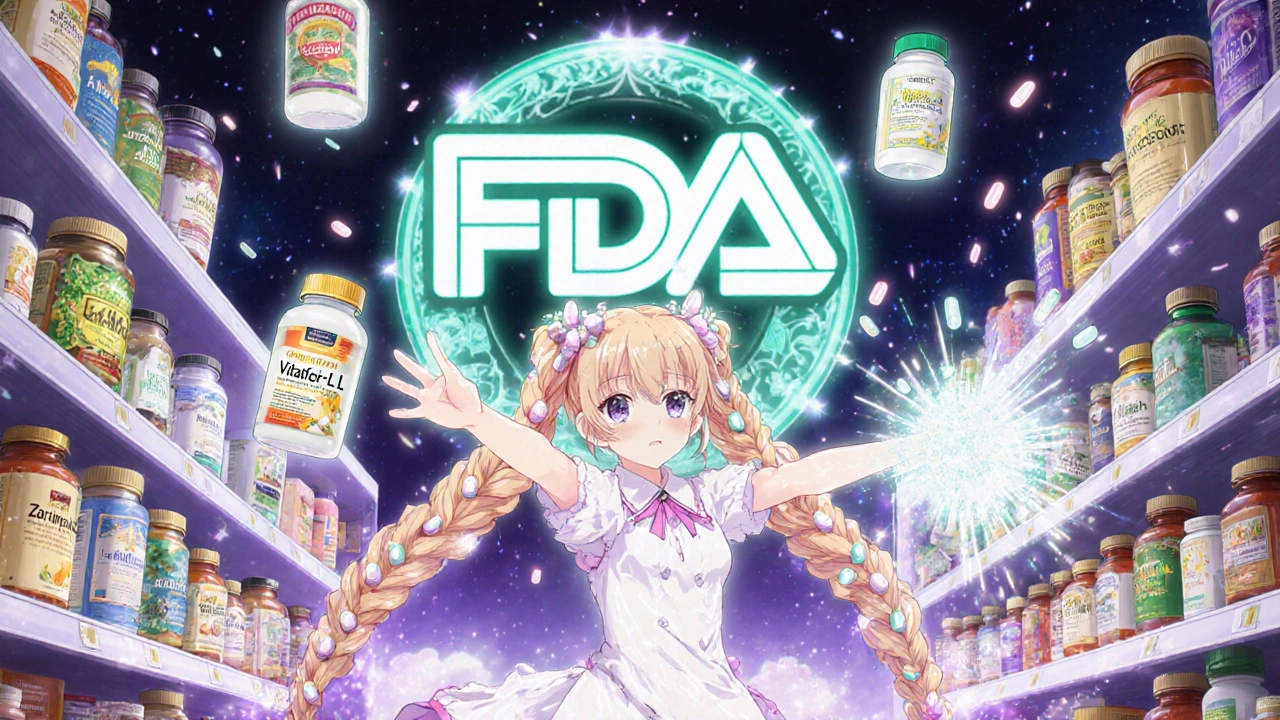 Nov, 3 2025
Nov, 3 2025
The FDA doesn’t wait for disasters to happen. When something risky slips through the cracks-whether it’s a faulty heart monitor, a supplement laced with erectile dysfunction drugs, or eggs contaminated with salmonella-the agency moves fast. In 2025, those moves have gotten even faster. New rules, sharper enforcement, and more targeted warnings mean the public needs to pay closer attention than ever before.
Medical Devices: Alerts Now Come Before the Recall
Starting September 29, 2025, the FDA changed how it handles dangerous medical devices. Before, if a pacemaker, insulin pump, or surgical robot showed signs of failure, the agency would issue a recall after confirming the problem. Now, they send out an Early Alert Communication the moment they suspect a serious risk-even before a full recall is finalized.
This isn’t just paperwork. It’s a lifeline for hospitals and clinics. If a device is found to overheat during surgery or deliver incorrect dosages, waiting days for a formal recall could cost lives. The new system lets facilities pull devices off shelves, notify patients, and switch to backups within hours. The FDA says this reduces the gap between detecting a problem and warning providers from 72 hours to under 24.
Class I recalls-the most serious type-jumped 15% in 2024 compared to 2023. The expansion of Early Alert Communications was a direct response. Devices linked to patient deaths or permanent injury now trigger alerts faster than ever. For example, in October 2025, a batch of glucose monitors gave falsely low readings. The alert went out on a Friday afternoon. By Monday, over 200 hospitals had swapped them out.
Drugs: Vaccines, Compounds, and Hidden Ingredients
Drug safety updates in 2025 have been anything but quiet. In June, the FDA required updated labeling for mRNA COVID-19 vaccines to include clearer warnings about myocarditis and pericarditis, especially in young men. The risk remains extremely low-about 1 in 50,000-but now patients and doctors know exactly what to watch for.
But the biggest story is the crackdown on compounded drugs. In September 2025, the FDA sent over 50 warning letters to companies making unapproved versions of semaglutide (the weight-loss drug also sold as Ozempic and Wegovy). These compounds are often sold online without proper testing. Some contained impurities, others had wildly inconsistent doses. One batch had 300% more active ingredient than labeled. The FDA called it the largest enforcement action in compounding history.
And it’s not just weight-loss drugs. In March 2025, One Source Nutrition recalled Vitality Capsules because they contained undeclared sildenafil and tadalafil-the same active ingredients in Viagra and Cialis. These are prescription drugs. Taking them without medical supervision can cause dangerous drops in blood pressure, especially if you’re on nitrates for heart conditions.

Dietary Supplements: The Wild West of Health Products
Dietary supplements are the most common source of FDA safety alerts. In 2025 alone, there were at least 12 major recalls involving hidden pharmaceuticals. Products labeled as “herbal,” “natural,” or “Ayurvedic” were found to contain sildenafil, tadalafil, sibutramine (a banned weight-loss drug), and even steroids.
One product, Vitafer-L Gold Liquid, was pulled in February because it had undeclared tadalafil. Another, Zaarah Herbals Rasayan Churan, was recalled in March after testing showed heavy metal contamination. These aren’t rare cases. The FDA tested 800 supplement samples in 2024 and found 1 in 5 contained unlisted drugs.
Why does this keep happening? Because the FDA can’t test every product before it hits shelves. The law treats supplements like food, not drugs. That means companies don’t need to prove safety or effectiveness before selling. The agency only acts after harm is reported-or after testing catches something dangerous.
Food Safety: Lead, Eggs, and Hidden Allergens
Food alerts in 2025 focused on two big threats: lead and bacteria. In August, the FDA warned against imported cookware from Southeast Asia that could leach lead into food during cooking. Lead poisoning is especially dangerous for children and pregnant women. The agency advised switching to stainless steel or ceramic cookware if you’re unsure of the source.
Then came the egg recalls. Black Sheep Egg Company issued a voluntary recall in September after tests showed salmonella in multiple batches. The same month, Kenz Henz Grade AA Large Pasture Raised Eggs were also pulled after similar findings. These weren’t just farm issues-they affected grocery chains nationwide.
And don’t forget about cinnamon. A July 2024 alert about elevated lead levels in ground cinnamon still echoes. Consumers tested their own spice jars and found some contained up to 10 times the safe limit. The FDA says this isn’t just about contamination-it’s about sourcing. Much of the cinnamon sold in the U.S. comes from countries with weaker food safety standards.

What’s Changing-and What’s Not
The FDA isn’t just reacting. It’s adapting. In June, they eliminated the Risk Evaluation and Mitigation Strategies (REMS) for CAR T-cell therapies. These are powerful cancer treatments that once required strict controls because of severe side effects. But after years of real-world data showing improved safety, the FDA determined the old rules were no longer needed. It’s a rare example of the agency reducing red tape when evidence supports it.
But gaps remain. Only 42% of consumers regularly check FDA recall notices. Among seniors, that number jumps to 68%-but only after a major incident like the pause on the Ixchiq chikungunya vaccine for people over 60. Most people don’t know where to look. The FDA has a Recalls, Market Withdrawals, & Safety Alerts page, but it’s buried under layers of government websites.
Healthcare providers are overwhelmed, too. A 2025 JAMA study found 35% of clinicians ignore routine safety alerts because there are too many. The FDA is now testing a new system that sends targeted alerts based on specialty-so a cardiologist gets device warnings, not supplement recalls.
How to Stay Protected
You don’t need to be a scientist to stay safe. Here’s what actually works:
- Sign up for FDA email alerts-it’s free. Go to fda.gov/safety/alerts and choose the categories you care about: drugs, devices, food, or supplements.
- Check the expiration and lot numbers on medications and supplements. If you hear about a recall, compare your product’s lot code to the FDA’s list.
- Don’t trust “natural” labels on supplements. If it promises rapid weight loss, muscle gain, or “miracle” results, it’s likely laced with drugs.
- Use trusted brands for cookware and food. Look for certifications like NSF or FDA-compliant labeling.
- Talk to your pharmacist if you’re on multiple medications. They can check for interactions with new recalls or label changes.
The FDA can’t protect you from everything. But they’re getting better at warning you before things go wrong. The real responsibility? Taking those warnings seriously-and acting on them.
How often does the FDA issue safety alerts?
The FDA issues dozens of safety alerts each month. In 2024, there were 178 food safety alerts, over 120 drug-related notices, and more than 90 medical device warnings. In 2025, the pace has accelerated, especially for medical devices and compounded drugs. The agency now releases alerts almost daily during peak periods.
Are FDA alerts always accurate?
Yes. The FDA doesn’t issue alerts without evidence. They rely on lab testing, consumer reports, manufacturer data, and healthcare provider submissions through MedWatch. While rare, mistakes can happen-like a false alarm due to a lab error. But the agency issues corrections quickly. If you’re unsure, check the official FDA page or call their hotline.
What should I do if I have a recalled product?
Stop using it immediately. Don’t throw it in the trash-some recalls require you to return the product. Follow the instructions on the FDA’s recall notice. For medications, contact your pharmacist about safe disposal or replacement. For devices, call your doctor. For food, don’t eat it and don’t give it to pets. If you’ve already used it and feel unwell, seek medical help right away.
Can I trust supplements labeled as “FDA approved”?
No. The FDA does not approve dietary supplements before they’re sold. Only drugs go through that process. If a supplement says “FDA approved,” it’s misleading. The FDA only steps in after a product is on the market and found to be unsafe. Always look for third-party testing seals like USP, NSF, or ConsumerLab.
Why do some recalls take so long to be announced?
It’s not always slow-it’s complex. For drugs and devices, the FDA needs to confirm the problem isn’t isolated, identify the affected lots, and work with the manufacturer to coordinate a recall. In urgent cases, like the recent semaglutide compound warnings, alerts go out within days. But for food products with long supply chains, tracing contamination can take weeks. The September 2025 medical device rule was designed to fix this delay.
Do FDA alerts apply to products bought online?
Yes. Whether you bought a supplement on Amazon, a medical device on eBay, or food from an international seller, if it’s sold in the U.S., it’s subject to FDA oversight. Many dangerous products enter through online marketplaces. Always check the FDA recall list-even if you bought something from a small seller.
Malia Blom
November 5, 2025 AT 17:13So the FDA’s now playing detective with every supplement and device? Cool. But let’s be real-this is just damage control after years of letting companies run wild. They didn’t wake up because they care. They woke up because people started dying and lawsuits piled up. The system’s broken, and this is just lipstick on a pig.
Erika Puhan
November 7, 2025 AT 13:48The regulatory arbitrage in the supplement space is staggering. The DSHEA framework is fundamentally obsolete-it treats pharmacologically active compounds as nutritional inputs, creating a structural incentive for adulteration. The FDA’s reactive posture is not merely inefficient-it’s epistemologically indefensible.
Kelsey Veg
November 8, 2025 AT 15:49so like… i bought that vitafer-l gold thing last month. is it bad?? like, should i panic??
Alex Harrison
November 9, 2025 AT 02:38My grandma got a new glucose monitor last week. I just checked the lot number-thank god I did. This post saved her from a potential disaster. FDA’s not perfect, but when they move fast, it actually matters. Thanks for sharing the details.
Jay Wallace
November 9, 2025 AT 19:34Why are we even talking about this? The U.S. has the best food and drug safety system in the world-period. If you’re buying Chinese cookware or sketchy supplements off Amazon, that’s your fault. Stop blaming the FDA for your poor life choices. We don’t need more bureaucracy-we need more personal responsibility.
Alyssa Fisher
November 11, 2025 AT 14:56It’s interesting how the FDA’s shift from recall-first to alert-first reflects a broader philosophical change in public health: from reaction to prevention. They’re treating risk as a continuous spectrum, not a binary state. That’s actually a pretty sophisticated move-especially when you consider how little public trust they’ve had for decades. Maybe this is the beginning of rebuilding it.
Alyssa Salazar
November 12, 2025 AT 15:59Let’s not sugarcoat it-compounded semaglutide is a nightmare. I work in pharmacy and we’ve seen patients show up with tachycardia because their ‘natural’ weight-loss pill had 3x the dose. The FDA’s crackdown? Long overdue. But they need to go further-shut down the shady online vendors, not just send warning letters. These aren’t small businesses-they’re pharmaceutical shell companies.
Beth Banham
November 14, 2025 AT 03:22I just signed up for the alerts. Never knew it was that easy. I used to just ignore all the emails until something bad happened. Now I check once a week. It’s not scary-it’s just… smart. Thanks for the reminder.
Brierly Davis
November 14, 2025 AT 21:48Big props to the FDA for finally acting on those dangerous supplements. I used to buy those ‘miracle’ weight gainer powders back in college-turned out one had sibutramine. I had a panic attack just from the caffeine + stimulant combo. Don’t be like me. Check the label. Ask your pharmacist. You’re worth it.
Amber O'Sullivan
November 16, 2025 AT 19:49the FDA is too slow and too bureaucratic and this is why people die. why wait for harm to happen before you act? you’re not a hospital you’re a government agency. fix the system not the symptoms
Jim Oliver
November 17, 2025 AT 14:30Of course the FDA ‘moved faster’-after 12 people died from fake Ozempic. Shocking, I know. They didn’t care until it was headline news. This isn’t reform-it’s PR. And don’t get me started on the ‘natural’ supplement nonsense. People still believe in magic pills. The real problem isn’t the FDA-it’s the gullible.
William Priest
November 18, 2025 AT 09:34Look, if you’re buying supplements from a guy named ‘Bobby’ on Instagram who says it’s ‘Ayurvedic’ and ‘ancient wisdom,’ you deserve what you get. The FDA isn’t here to babysit adults who think ‘herbal’ means ‘safe.’ This isn’t a failure of regulation-it’s a failure of basic literacy.
Rachel Puno
November 19, 2025 AT 16:17You guys are overthinking this. Just sign up for the alerts. Check your meds. Don’t buy random powders off Amazon. It’s not rocket science. The FDA’s doing their part-now it’s on us to not be lazy. Small steps save lives. Start today.